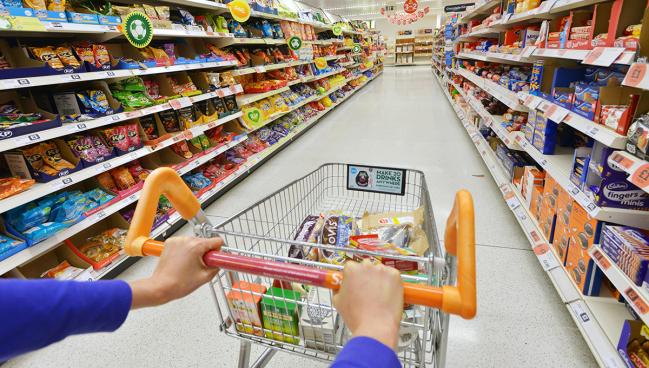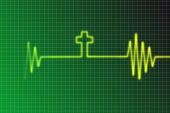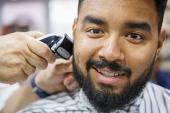Grocery Carts a Tool for AF Screening? An Early Look
The SHOPS-AF feasibility study shows an ECG-equipped cart can enable people to be checked while doing their daily shopping.

Specially designed shopping carts with ECG sensors can be used at grocery stores to detect atrial fibrillation (AF), new data from the SHOPS-AF feasibility study suggest.
Although false-negatives were common and the technology requires some tweaking, the screening method merits further investigation, said Ian D. Jones, PhD (Liverpool John Moores University, England). Jones reported the findings last week at the Association of Cardiovascular Nursing and Allied Professions (ACNAP) 2023 meeting in Edinburgh, Scotland.
SHOPS-AF is the latest study attempting to “meet people where they are,” whether that’s through tailored nutritional advice at the supermarket or BP-lowering interventions at the barbershop or church, when trying to reduce the harms of cardiovascular disease.
Atrial fibrillation presents a unique need, Jones noted, as it’s often undiagnosed and carries serious consequences like stroke, cognitive decline, and heart failure.
For him, the supermarket seemed like an ideal place, in that people can be screened without interrupting their daily routine.
The good news, and something that couldn’t be taken for granted, is that two-thirds of the shoppers asked to participate were willing to do so, said Jones. Around the time the study was conducted, “there were certainly a lot of conspiracy theories about people checking your data and 5G, masks, and the COVID vaccine [having] microchips in it. . . . We thought, well, if people won’t use it, it doesn’t matter if it’s capable of recording an ECG or not,” he noted, adding that most of the shoppers who didn’t agree were simply too rushed to take part.
STOPS-AF
The STOPS-AF researchers bought trolleys from the same manufacturer that sold the carts to the supermarkets, modifying them so that their handlebar contained a cylindrical single-lead ECG sensor (MyDiagnostick Medical). Study participants were asked to hold the handlebar for at least 60 seconds while using the cart.
- If no irregular heartbeat was found, the sensor lit up green, after which a researcher did a manual pulse check to confirm the lack of AF.
- If the sensor detected an irregular heartbeat, it turned red. In these instances suggestive of AF, the in-store pharmacist performed a manual pulse check and asked the person to repeat their measurement on another ECG-equipped bar (not attached to a cart) while standing still. A cardiologist then reviewed the ECG recordings of these individuals and those who had an irregular heartbeat during the manual check.
Over a 2-month period, 3,709 shoppers at four Liverpool grocery stores were invited to use the screening cart, of whom 2,155 (58.1%) did so. ECG data suggested atrial fibrillation for 220 participants: the cardiologist reviewing the ECGs found no evidence of AF for 115 people and unclear results for 46 recordings.
Atrial fibrillation was diagnosed in the remaining 59 (average age 74 years; 43% women). Among them, 20 people already knew they had the arrhythmia and 39—1.8% of those screened—were previously undiagnosed.
To assess diagnostic accuracy, the researchers analyzed their data three ways: excluding all unclear ECGs, assuming all individuals with unclear ECGs in fact had AF, and assuming none of those with unclear ECGs had AF. Sensitivity ranged from 0.70 to 0.93 and specificity from 0.15 to 0.97. The positive predictive value fell between 0.24 and 0.56, while the negative predictive value fell between 0.55 and 1.00.
If people won’t use it, it doesn’t matter if it’s capable of recording an ECG or not. Ian D. Jones
The SHOPS-AF participants were told about their results after testing. Those with no AF on ECG were contacted and reassured, and those with suspected AF were seen by a cardiologist to undergo a 12-lead ECG.
A key element in their study design was the pharmacist’s input, Jones said. “You wouldn't want to have somebody pushing a trolley around [and] it comes up red saying you possibly have AF and then have no access to a healthcare professional for weeks, so we deliberately completed this study in Sainsbury's stores [with pharmacists] on site.”
The investigators are now exploring the perspectives of the pharmacists and store managers as to whether the screening method is viable. For example, he explained, pharmacists don’t want to be spending large chunks of time evaluating the results and store managers don’t want to distract customers from shopping.
Up next, said Jones, is making tweaks to the technology. One question is whether the ECG readings will be as accurate in people with darker skin tones. Additionally, right now the sensor requires 60 seconds to take measurements and during this time people may not hold still, with the movement introducing artifacts to the ECG readings, he said. So they’re working to create a device that can work more quickly while still being cylindrical in shape, perhaps labeled with specific spots for hand placement. And finally, there’s hope that machine learning could be used to develop models that clean up the ECG data.
Caitlin E. Cox is Executive Editor of TCTMD and Associate Director, Editorial Content at the Cardiovascular Research Foundation. She produces the…
Read Full BioSources
Jones ID. Supermarket/hypermarket opportunistic screening for AF: SHOPS-AF. Presented at: ACNAP 2023. June 23, 2023. Edinburgh, Scotland.
Disclosures
- The study was funded by Bristol Myers Squibb.
- Jones reports no relevant conflicts of interest.





Comments